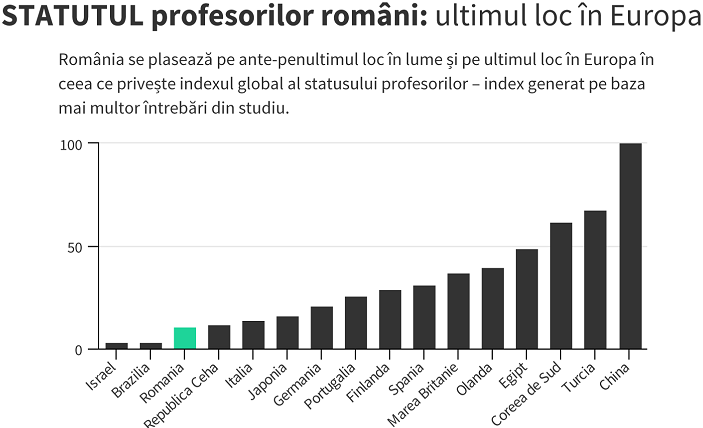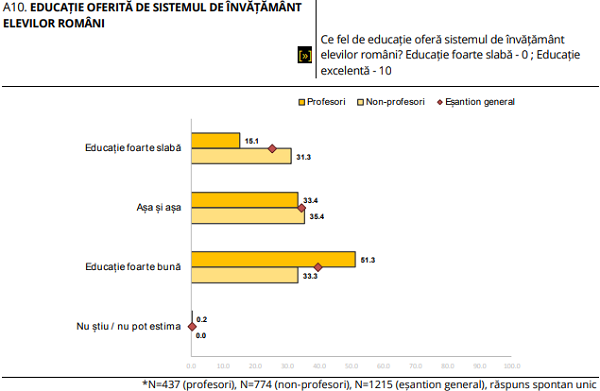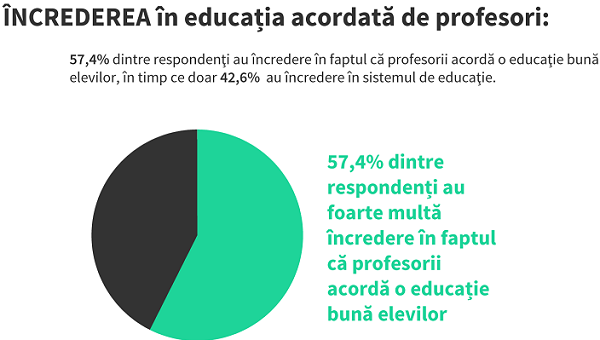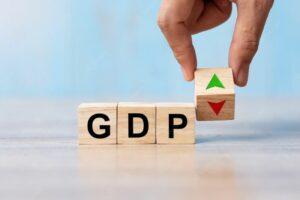In Romania, only 3.5% of the young people from the 2015 class graduated from education sciences faculties, which confirms that fewer Romanians want to pursue a career in education.
The European average is 9.3% of all graduates, with the largest shares registered in Spain, Cyprus, Luxembourg and Hungary (see table below).
- EU average Share
*
Explanations for the lack of attractiveness of this profession are presented in a research by the Romanian Business Leaders Foundation (RBL) and D&D Research, which shows that Romania ranks the previous-but-one in the world and the last in Europe in terms of the index of global standing of teachers in society, which means a crash in the perception of the standing of teachers.
The index is obtained by calculating the weight of responses such as the wages that teachers should get, the respect that respondents believe the society and students show to teachers, and the parents’ confidence (whether teachers or not) in recommending their children to pursue such a career.
The teaching profession is not desirable, according to one of the research findings – one third of parents would not encourage their children to pursue a career in this field, and the percentage reaches 50% in the group of teachers interviewed for the survey.
It is a poorly paid profession (wages should be two-thirds above the current level), and the students no longer respect teachers, according to the opinion of most people who responded to the survey.
„A relative majority of respondents see the education act as any public service, close to the civil servant. They do not see it as a vocation profession that should be remunerated based on performance and enjoy not only the trust but also the respect deserved by other vocation professions such as the medical profession,” says Dragos Neacsu, member of RBL board of directors and CEO of Erste Asset Management.
*
- Standing of teachers in Romania: bottom position in Europe
- Romania ranks the previous-but-one in the world and the last in Europe in terms of the index of global standing of teachers – obtained based on several questions from the research
*
A share of over 31% of respondents believe that the education system offers a very poor education:
*
- Education provided by the education system to Romanian pupils
- What kind of education does the system provide to Romanian pupils? Very poor education -0; excellent education – 10
*
But the confidence that teachers provide a good education to pupils ranks in Romania over the average of the countries included in the research, with 57.4% of all participants interviewed:
*
- TRUST in the education that teacher provide
- 57.4% of respondents trust that teachers provide a good education to pupils, while only 42.6% trust the education system
*
At the same time, though, the study shows that there is no correlation between trust and respect for teachers. In other words, even if there is confidence that teachers can provide a good education to pupils, that does not mean that their profession is worthy of the same respect as other professions included in the study.
Students’ respect for teachers
With about 18 percentage points, Romania ranks close to the bottom of the list in terms of students’ respect for teachers – only 1% of respondents totally agree with the statement that „Today’s pupils respect their teachers.” This is the lowest percentage of all countries included in the study.
Also, 17.1% of respondents think it is very easy to become a teacher today, and 27% somehow agree this statement.
France, the same percentage of graduates: but…
Only France had in 2015 a (slightly) lower share of higher education graduates with the specialization in education sciences – 3.4.
However, it allocated 5.5% of GDP to education in 2015, while the percentage was just over 3% in Romania. In 2018, the budget is below 3% of GDP in our country.
Also, Romania has the highest share of unskilled teachers in the EU, Romanian pupils recorded disastrous results in PISA international tests over the last few years (ranked 26th or 27th in the EU 28, compared to France with positions 16-17), and the accreditation exams show that neither teacher’s level of preparedness is very high.














